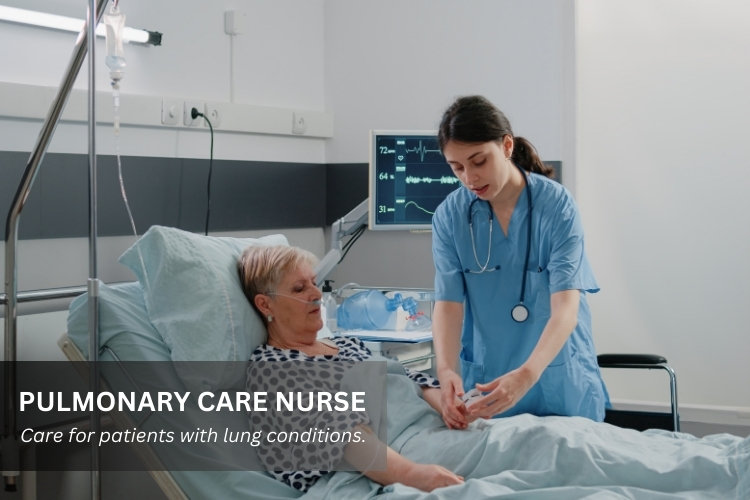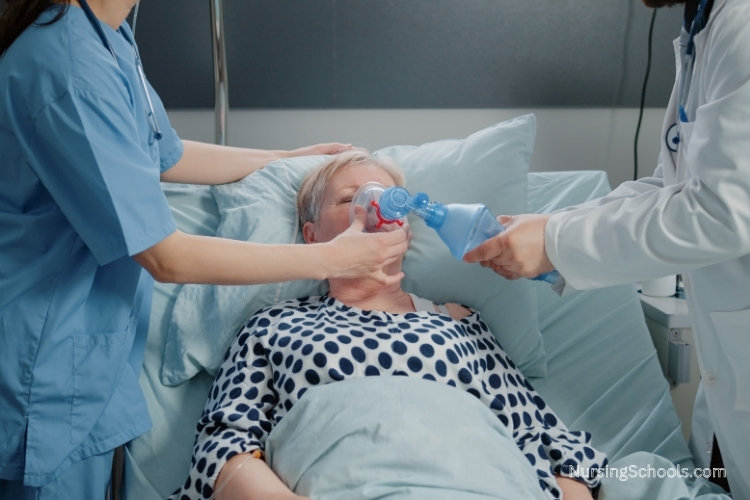Pulmonary Care Nurse
Healthcare Career Guide

Breathing is essential, yet for many patients with respiratory conditions, it can be a daily struggle. Pulmonary Care Nurses play a vital role in helping individuals manage chronic lung diseases, recover from surgery, and navigate complex breathing disorders. Working closely with physicians and respiratory therapists, these nurses provide both clinical expertise and compassionate support in hospitals, pulmonary rehab centers, and home care settings. Let's delve into the Pulmonary Care Nurse specialty and explore what it takes to thrive in this rewarding nursing role.
Overview
What Is a Pulmonary Care Nurse?
A Pulmonary Care Nurse specializes in treating patients with respiratory conditions such as asthma, chronic obstructive pulmonary disease (COPD), pneumonia, lung cancer, and other pulmonary disorders. These nurses assist with breathing treatments, oxygen therapy, and patient education to improve lung function and overall quality of life.
Pulmonary Care Nurses work in hospitals, pulmonary rehabilitation centers, critical care units, and outpatient clinics. They collaborate with pulmonologists, respiratory therapists, and other healthcare providers to monitor and manage respiratory health.
This career requires strong assessment skills, knowledge of respiratory therapies, and the ability to provide patient-centered care for individuals with chronic and acute lung conditions.
Education
How Do I Become a Pulmonary Care Nurse?
Becoming a Pulmonary Care Nurse requires a combination of traditional nursing education, clinical experience, certification, and specialized training in respiratory health and critical care nursing. Follow these steps to enter this challenging and rewarding healthcare career:
- Earn a Nursing Degree. Complete an Associate Degree in Nursing (ADN) or Bachelor of Science in Nursing (BSN). A BSN is preferred for specialized pulmonary nursing roles.
- Pass the NCLEX-RN. Obtain your nursing license by passing the National Council Licensure Examination for Registered Nurses (NCLEX-RN).
- Gain Clinical Experience. Work as a Registered Nurse (RN) in respiratory care units, intensive care units (ICUs), or pulmonary rehabilitation settings.
- Obtain Pulmonary Nursing Certification. Consider earning the Certified Respiratory Care Nurse (CRCN) credential through the American Association of Critical-Care Nurses (AACN) or the Certified Asthma Educator (AE-C) certification.
- Continue Professional Development. Stay updated with advancements in pulmonary care, mechanical ventilation, and respiratory therapies through continuing education and professional workshops.
On average, it takes 4-6 years to become a Pulmonary Care Nurse, including nursing school, licensure, and obtaining specialized training. Certifications enhance job opportunities and credibility in this field.

Average Salary
How Much Does a Pulmonary Care Nurse Make?
Salaries for Pulmonary Care Nurses vary based on experience, location, and work setting. On average, a Pulmonary Care Nurse can expect to earn between $80,000 and $110,000 annually.
Average annual salary for a Pulmonary Care Nurse:
- Entry-level: $80,000 - $90,000 per year.
- Mid-career: $90,000 - $100,000 per year.
- Experienced: $100,000 - $110,000 per year.
The U.S. Department of Labor reports that Pulmonary Care Nurses earn an average hourly wage of approximately $42.00 per hour. Assuming a 40-hour workweek, this equates to an annual salary of $87,360. The lowest 10% earn less than $36.00 per hour, while the highest 10% earn more than $50.00 per hour, resulting in an annual salary range of $74,880 to $104,000 per year.
Job Duties
What Does a Pulmonary Care Nurse Do?
Pulmonary Care Nurses provide specialized care to patients with respiratory illnesses. Their role includes monitoring lung function, administering treatments, and educating patients on managing their conditions.
The most common job duties of a Pulmonary Care Nurse:
- Assessing Respiratory Conditions. Perform pulmonary function tests, evaluate symptoms, and monitor oxygen levels.
- Administering Breathing Treatments. Provide nebulizer therapy, oxygen therapy, and inhaler education.
- Managing Mechanical Ventilation. Assist patients using ventilators and non-invasive respiratory support devices.
- Educating Patients on Lung Health. Teach patients how to manage conditions like COPD, asthma, and emphysema.
- Monitoring for Complications. Identify signs of respiratory distress, infections, or worsening pulmonary conditions.
- Providing Smoking Cessation Support. Counsel patients on quitting smoking and improving lung health.
- Coordinating Pulmonary Rehabilitation. Assist patients in regaining lung function through exercise and therapy programs.
- Advanced Duties. Experienced Pulmonary Care Nurses may specialize in sleep disorders, home ventilation management, or critical care respiratory nursing.
Pulmonary Care Nurses typically work in hospitals, pulmonary clinics, rehabilitation centers, and home healthcare settings. Their role is essential in helping patients manage chronic lung diseases and improve respiratory function.

Essential Skills
What Skills Does a Pulmonary Care Nurse Need?
Pulmonary Care Nurses require a combination of critical care expertise, respiratory assessment skills, and patient education abilities. These skills enable them to support patients with chronic and acute lung conditions effectively.
Here are some of the skills a Pulmonary Care Nurse needs to succeed:
- Pulmonary Assessment. Evaluate lung function and detect signs of respiratory distress.
- Mechanical Ventilation Management. Assist with ventilator settings and troubleshooting for critically ill patients.
- Oxygen Therapy Administration. Provide and adjust supplemental oxygen therapy for patients with chronic lung diseases.
- Critical Thinking. Quickly assess and intervene in cases of respiratory failure or distress.
- Patient Education. Teach patients how to manage chronic lung conditions and improve respiratory health.
- Emergency Response. Recognize and respond to respiratory emergencies such as acute asthma attacks or pulmonary embolisms.
- Collaboration. Work with pulmonologists, respiratory therapists, and rehabilitation teams to develop comprehensive treatment plans.
- Compassion. Provide emotional support to patients struggling with chronic breathing difficulties.
One of the biggest challenges of being a Pulmonary Care Nurse is managing patients with progressive respiratory diseases that have no cure. However, the role is highly rewarding, as it allows nurses to improve patients' lung function and enhance their quality of life.
Last updated: March 12, 2025
References:
- Registered Nurses. Bureau of Labor Statistics, U.S. Department of Labor. Occupational Outlook Handbook. Retrieved March 12, 2025.
- NCLEX Nurse Licensure Exam. National Council of State Boards of Nursing (NCSBN). Retrieved March 12, 2025.
- Pulmonary Care Nurse. Johnson & Johnson, Nursing Careers. Retrieved March 12, 2025.
- Pulmonary Care Nurse Salary in the United States. ZipRecruiter, Healthcare Career Path. Retrieved March 12, 2025.
- What Does a Respiratory Nurse Do. WGU Healthcare Career Guides. Retrieved March 12, 2025.
- What Is a Pulmonary Nurse. Pacific College, Career Profile. Retrieved March 12, 2025.
- Respiratory and Pulmonary Care Certification. The National Board for Respiratory Care (NBRC). Retrieved March 12, 2025.
- Critical Care Nurse Certification. American Association of Critical-Care Nurses (AACN). Retrieved March 12, 2025.
- Cardiovascular and Pulmonary Rehabilitation Certification. American Association of Cardiovascular and Pulmonary Rehabilitation (AACVPR). Retrieved March 12, 2025.


